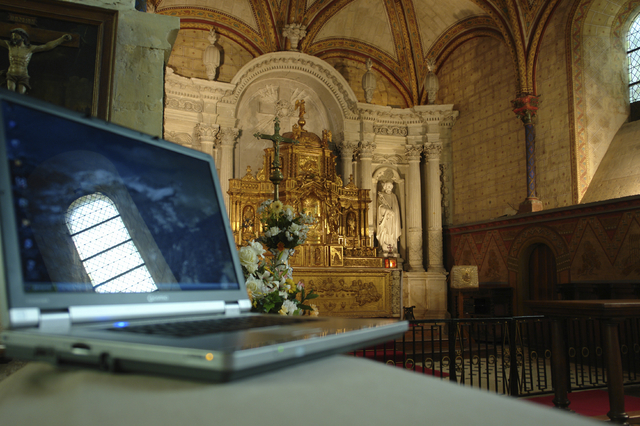Is technology good for religion?

![]() “The Holy Words — it matters not how I got them, it’s ‘have I retained them?’”
“The Holy Words — it matters not how I got them, it’s ‘have I retained them?’”
To this older man, who took part in a survey on technology and religion, it does not matter whether he is reading the scriptures on his phone or in “the well-worn pages of the family Bible.” The words are sacred either way, according to a new study published in the Journal of Media and Religion.
Researchers found that Baptists — even those over the age of 60 — are embracing the use of new technology for religious purposes, especially for its convenience.
“If you go somewhere on a trip, you can just take the one little thing, which is about the size of a small book, and then you’ve got access to many books on that one thing,” one female respondent in her late-60s explained.
But listed conveniences extended past that of travel. Many of the 234 respondents cited the convenience of technology for teaching and learning purposes. In fact, the study found that Sunday school and Bible study teachers were more comfortable using technology than nonteachers.
“It’s a lot easier on the Internet to look up obscure things — things that are hard to track down otherwise,” one teacher said. “I’ll spend time looking things up.”
A 2015 Barna Group study found that 87 percent of pastors “believe it is theologically acceptable for a church to provide faith assistance or religious experiences to people through the Internet,” and 86 percent of pastors believe people in their community would find such a use of technology acceptable.
The influence of technology on religion is far and wide. According to a 2013 Barna study, 70 percent of practicing Christian millennials use a screen (i.e. phone or computer) to read scripture. And technology has no limit on age: A 2014 Pew Research Center study reported that 52 percent of adults aged 30 to 49 had a tablet and 40 percent had an e-reader, and those aged 50 to 64 scored 37 percent and 32 percent, respectively.
However, while some see technology as an effective tool for religion, a 2014 MIT study found the Internet is causing a drop in religiosity in America. Researchers found a correlation between increased Internet users and increased number of people unaffiliated with religion.
The consequences of technology were seen by respondents of the study, who acknowledged that the double-edged sword of technology included distraction on the flip side.
“Relationships are incredibly important in religion,” one older male commented. “Where’s that coming from if all you’re doing is looking at a screen? That haunts me.”
This thought was echoed by Roxanne Stone, a vice president at Barna Group, as she commented on pastors’ use of the Internet.“Much of a pastor’s role is about presence: presence in a community of believers, presence in the taking of communion, presence in the service of others, presence in communal prayer and worship,” she said. “The Internet can offer an important and accessible supplement to these physical activities, but pastors are reluctant to say it can fully replace them or duplicate them.”












